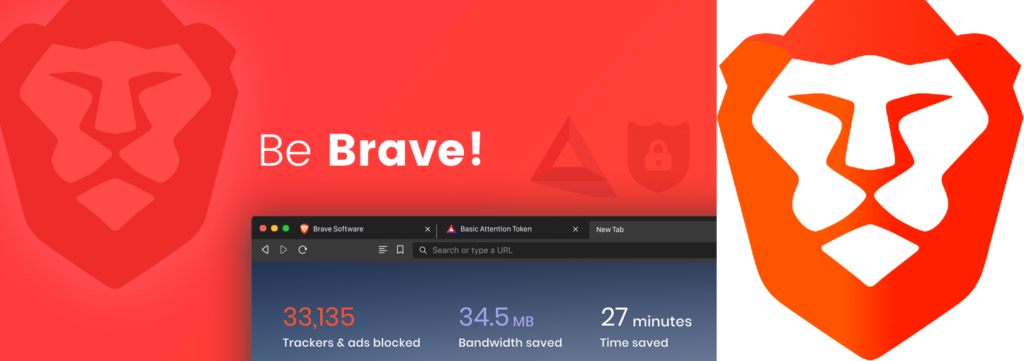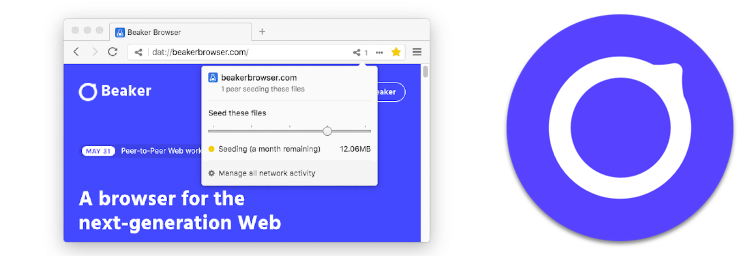Web 3.0 browsers are not vastly different from the current web browsers, except for some additional features and integrations to support Web3 services and protocols. With these new capabilities, the browsers will be able to access dApps or websites that on a peer-to-peer network. Since decentralization is a fundamental principle of Web3, it is crucial for these decentralized browsers to prioritize user privacy and confidentiality. Additionally, they should include a crypto wallet that allows users to receive, send, or swap their cryptocurrencies and sign in to Web3 websites. These wallets can store both cryptocurrency and non-fungible tokens.
Furthermore, in this article, we will examine the top three Web3 browsers that offer faster browsing, integrate cryptocurrency, prioritize user privacy, and provide access to the decentralized web.
Brave Browser
Brave browser has gained widespread use due to its ad-blocker and fast browsing experience, with over 25 million active users at present. It is one of the major browsers that are moving towards Web 3.0. It has recently integrated blockchain into its features, which includes its own cryptocurrency called BAT. Additionally, Brave supports crypto wallets and integrates a P2P file hosting solution. Several features of Brave make it part of Web 3.0. One of these features is the Basic Attention Token (BAT), which is an Ethereum-based token. Brave prioritizes privacy and enables users to watch ads and earn BAT tokens without collecting any data. This system is beneficial to the advertiser, publisher, and user, all within the user’s device.
Another notable feature of Brave is the Brave wallet, which provides several functionalities such as asset transfer, live market graphs, and swapping. Currently, it supports the Ethereum blockchain network and allows users to purchase crypto with cash. Although still in its beta stage, the Brave wallet will soon support holding and transferring NFTs, interaction with Dapps, multiple blockchain support, and a mobile version. Brave has integrated the InterPlanetary File System (IPFS), which is a decentralized file-hosting solution that enables peer-to-peer file hosting without any concerns about server-down issues or attacks, similar to Bit Torrent.

Beaker Browser
Beaker Browser aims to return control of the web to its users by creating a decentralized peer-to-peer web browser. The aim is to create a new server-less internet that is built on a peer-to-peer network protocol called Dat. With Beaker, users can both surf the web like any other Chromium-based browser. They can create and support a new, decentralized internet. Beaker builds “communities of trust” among peers instead of using “proof of work” requirements to slow down the web, unlike blockchain-based web platforms. The peer-to-peer network protocol Dat enables websites to spread from people seeding them, similar to BitTorrent. This means that users do not have to rely on centralized servers, internet service providers, and web hosting firms to collaborate and build a better world.
In addition to its decentralized architecture, Beaker Browser also offers several features that make it a unique browsing experience. For example, Beaker includes a built-in peer-to-peer website hosting feature. With this feature, users can easily publish and host their own websites without relying on centralized web hosting services. Another notable feature of Beaker Browser is its ability to support web apps that have modern web technologies. These include JavaScript and WebAssembly. This means that developers can create decentralized web apps. These can run directly within the browser, without relying on external servers. These apps can be hosted on the peer-to-peer network and can be accessed by anyone using Beaker Browser.
Overall, Beaker Browser represents an exciting development in the world of web browsing. By using a peer-to-peer network protocol, it offers a more decentralized and democratic alternative to the centralized web architecture. With its support for modern web technologies and user privacy, it’s an excellent choice for anyone looking for a unique and innovative browsing experience.

Opera
Opera is a well-known web browser that has a large user base due to its fast and data-saving capabilities. It also features a built-in ad blocker and personalized browsing that enhance the user experience. Recently, Opera added support for Web 3.0, as well as a VPN, multi-network crypto wallet, and dApp support. The Opera browser’s Web 3.0 support includes a multi-network crypto wallet, allowing users to store and exchange tokens and cryptocurrencies. The wallet can also serve as an online identity on decentralized platforms by linking your wallet address to sign in. Currently, it supports networks such as ETH, TRX, and CBK, with plans to add more in the future.
The private keys of the Opera wallet are stored on the user’s smartphone. This effectively turns it into a hardware wallet for their multi-wallet. These private keys are required to access the Opera wallet and sign transactions. Additionally, Opera also supports decentralized apps and websites, similar to Osiris, providing easy access without any security risks. The dAppstore marketplace, which is home to a vast collection of decentralized apps, can also be accessed using Opera. In addition to its multi-network crypto wallet and dApp support, Opera also offers a built-in VPN, which can help users enhance their privacy and security while browsing. The VPN is free to use and allows users to choose from servers present in different regions. This gives them the ability to bypass geo-restrictions and access content that may be unavailable in their country.
Overall, Opera is a feature-rich browser that offers a wide range of tools and features for users. With its built-in VPN, multi-network crypto wallet, dApp support, and other features, Opera is a solid choice for users who prioritize privacy, security, and ease of use.

Developing Decentralized Browsers: How Genesis Convergence is Contributing to the Future of the Internet?
Genesis Convergence has the potential to make a significant impact in the development of decentralized browsers. With our expertise in software development, we can contribute to the creation of decentralized browsers that prioritize security, privacy, and user control. Genesis Convergence can explore opportunities to develop new decentralized browser applications or integrate existing decentralized technologies into our clients’ projects.
